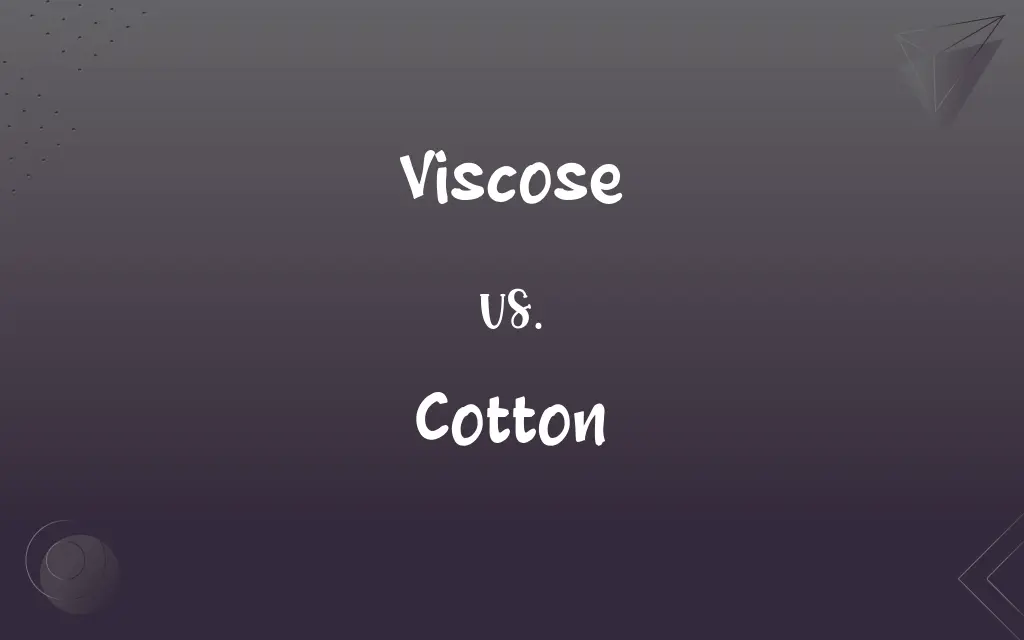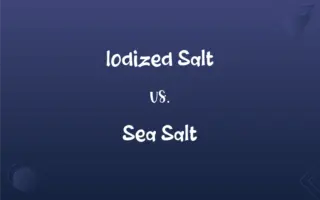Viscose vs. Cotton: What's the Difference?
Edited by Aimie Carlson || By Janet White || Published on January 4, 2024
Viscose, a semi-synthetic fiber, is made from regenerated cellulose, whereas cotton is a natural, soft fiber grown on cotton plants.

Key Differences
Viscose is produced by treating cellulose with chemicals, creating a fiber that is semi-synthetic. Cotton, in contrast, is a natural fiber harvested from cotton plants, requiring minimal chemical processing.
Viscose fabrics are known for their silk-like feel, offering smoothness and a draping quality. Cotton, on the other hand, is praised for its softness, breathability, and comfort, making it ideal for a wide range of clothing.
Viscose tends to be less durable and may weaken when wet, requiring careful washing. Cotton is more durable and can withstand higher temperatures, making it easier to maintain and longer-lasting.
The production of viscose can be environmentally taxing due to the chemicals used. Cotton growing requires significant water and pesticide use, impacting the environment differently.
Viscose is often used in dresses and blouses for its flowy nature. Cotton, versatile and comfortable, is used in everything from jeans to towels.
ADVERTISEMENT
Comparison Chart
Origin
Semi-synthetic, made from cellulose.
Natural, from cotton plants.
Texture
Smooth, silk-like.
Soft, comfortable.
Durability
Less durable, weakens when wet.
More durable, withstands washing.
Environmental
Chemical-intensive production.
High water and pesticide use.
Typical Use
Dresses, blouses (draping fabric).
Versatile - clothes, towels, beddings.
ADVERTISEMENT
Viscose and Cotton Definitions
Viscose
Viscose is a soft, silk-like fabric made from regenerated cellulose.
Her dress was made of viscose, giving it a luxurious sheen.
Cotton
Cotton is a natural, soft fiber obtained from cotton plants.
Her favorite shirt was made of 100% cotton, ensuring comfort.
Viscose
Viscose is a semi-synthetic material used in lightweight clothing.
His summer suit was made of breathable viscose.
Cotton
Cotton is a hypoallergenic, skin-friendly material.
For sensitive skin, cotton clothing is the best choice.
Viscose
Viscose is a versatile textile used in various fashion items.
Viscose blends are popular for their softness and durability.
Cotton
Cotton is a durable fabric used in a variety of clothing.
Denim, a sturdy cotton fabric, is ideal for jeans.
Viscose
Viscose refers to a type of rayon, known for its draping qualities.
The viscose curtains draped elegantly over the window.
Cotton
Cotton refers to a breathable, absorbent textile material.
Cotton towels are preferred for their high absorbency.
Viscose
Viscose is a fabric often used as a silk substitute.
She preferred viscose scarves as they were more affordable than silk.
Cotton
Cotton is a staple fiber in the textile industry.
Cotton is widely used in the production of bed sheets.
Viscose
A thick, golden-brown viscous solution of cellulose xanthate, used in the manufacture of rayon and cellophane.
Cotton
Any of various shrubby plants of the genus Gossypium, having showy flowers and grown for the soft white downy fibers surrounding oil-rich seeds.
Viscose
Viscose rayon.
Cotton
The fiber of any of these plants, used in making textiles and other products.
Viscose
Viscous.
Viscose
Of, relating to, or made from viscose.
Viscose
A viscous orange-brown liquid obtained by chemical treatment of cellulose and used as the basis of manufacturing rayon and cellulose film.
Viscose
A fabric made from this material.
Viscose
A cellulose ester obtained by treating cellulose with caustic soda
Viscose
A rayon fabric made from viscose (cellulose xanthate) fibers
FAQs
Is viscose environmentally friendly?
It can be taxing due to chemical use.
How is viscose produced?
By treating cellulose with chemicals.
How is cotton harvested?
From the bolls of cotton plants.
What is cotton?
A natural fiber obtained from the cotton plant.
What is viscose?
A semi-synthetic fiber made from regenerated cellulose.
Is cotton environmentally friendly?
Its cultivation requires significant water and pesticides.
Does cotton shrink?
Yes, especially if washed in hot water.
Is cotton suitable for sensitive skin?
Yes, it's generally hypoallergenic.
Is viscose suitable for sensitive skin?
It might irritate some skin types.
What are common uses of viscose?
In dresses, blouses, and linings.
How do you care for cotton garments?
Machine washable, can endure high temperatures.
Can viscose shrink?
Yes, it can shrink if not washed properly.
What are common uses of cotton?
In clothing, towels, and bedding.
Is cotton breathable?
Yes, it's highly breathable.
What is the texture of viscose?
Smooth and silk-like.
Is viscose breathable?
Yes, but less so than cotton.
Can viscose be recycled?
Recycling is challenging due to its chemical process.
Can cotton be recycled?
Yes, it's easier to recycle.
What is the texture of cotton?
Soft and comfortable.
How do you care for viscose garments?
Gentle washing and avoiding high heat.
About Author
Written by
Janet WhiteJanet White has been an esteemed writer and blogger for Difference Wiki. Holding a Master's degree in Science and Medical Journalism from the prestigious Boston University, she has consistently demonstrated her expertise and passion for her field. When she's not immersed in her work, Janet relishes her time exercising, delving into a good book, and cherishing moments with friends and family.
Edited by
Aimie CarlsonAimie Carlson, holding a master's degree in English literature, is a fervent English language enthusiast. She lends her writing talents to Difference Wiki, a prominent website that specializes in comparisons, offering readers insightful analyses that both captivate and inform.







































































